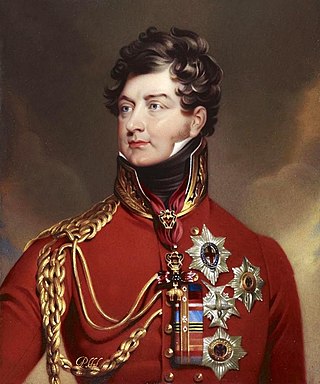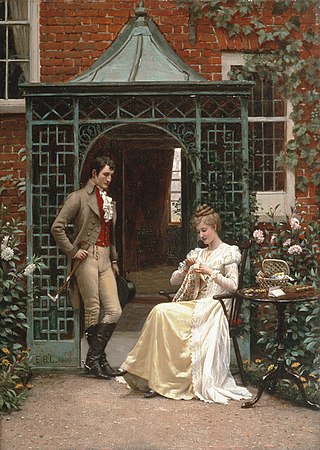Regency may refer to:
Distinctive trends in British architecture, culture, fashion, literature, and politics during the British Regency period, e.g.:

Historical fiction is a literary genre in which a fictional plot takes place in the setting of particular real historical events. Although the term is commonly used as a synonym for historical fiction literature, it can also be applied to other types of narrative, including theatre, opera, cinema, and television, as well as video games and graphic novels. It often makes many use of symbolism in allegory using figurative and metaphorical elements to picture a story.

A prince regent or princess regent is a prince or princess who, due to their position in the line of succession, rules a monarchy as regent in the stead of a monarch, e.g., as a result of the sovereign's incapacity or absence.
Gold Coast may refer to:

The Regency era of British history is commonly described as the years between c. 1795 and 1837, although the official regency for which it is named only spanned the years 1811 to 1820. King George III first suffered debilitating illness in the late 1780s, and relapsed into his final mental illness in 1810; by the Regency Act 1811, his eldest son George, Prince of Wales, was appointed prince regent to discharge royal functions. When George III died in 1820, the Prince Regent succeeded him as George IV. In terms of periodisation, the longer timespan is roughly the final third of the Georgian era (1714–1837), encompassing the last 25 years or so of George III's reign, including the official Regency, and the complete reigns of both George IV and his brother and successor William IV. It ends with the accession of Queen Victoria in June 1837 and is followed by the Victorian era (1837–1901).

A romance novel or romantic novel is a genre fiction novel that primary focuses on the relationship and romantic love between two people, typically with an emotionally satisfying and optimistic ending. Authors who have contributed to the development of this genre include Samuel Richardson, Jane Austen, and Charlotte Brontë.
Hyatt Hotels Corporation, commonly known as Hyatt Hotels & Resorts, is an American multinational hospitality company headquartered in the Riverside Plaza area of Chicago that manages and franchises luxury and business hotels, resorts, and vacation properties. Hyatt Hotels & Resorts is one of the businesses managed by the Pritzker family. Hyatt has more than 1350 hotels and all-inclusive properties in 69 countries, across six continents.

Blackadder the Third is the third series of the BBC sitcom Blackadder, written by Richard Curtis and Ben Elton, which aired on BBC1 from 17 September to 22 October 1987. The series is set during the Georgian Era, and sees the principal character, Mr. E. Blackadder, serve as butler to the Prince Regent and have to contend with, or cash in on, the fads of the age embraced by his master.

Regency architecture encompasses classical buildings built in the United Kingdom during the Regency era in the early 19th century when George IV was Prince Regent, and also to earlier and later buildings following the same style. The period coincides with the Biedermeier style in the German-speaking lands, Federal style in the United States and the French Empire style. Regency style is also applied to interior design and decorative arts of the period, typified by elegant furniture and vertically striped wallpaper, and to styles of clothing; for men, as typified by the dandy Beau Brummell and for women the Empire silhouette.

Regency romances are a subgenre of romance novels set during the period of the British Regency (1811–1820) or early 19th century. Rather than simply being versions of contemporary romance stories transported to a historical setting, Regency romances are a distinct genre with their own plot and stylistic conventions. These derive not so much from the 19th-century contemporary works of Jane Austen, but rather from Georgette Heyer, who wrote over two dozen novels set in the Regency starting in 1935 until her death in 1974, and from the fiction genre known as the novel of manners. In particular, the more traditional Regencies feature a great deal of intelligent, fast-paced dialogue between the protagonists and very little explicit sex or discussion of sex.
The Regency Acts are Acts of the Parliament of the United Kingdom passed at various times, to provide a regent in the event of the reigning monarch being incapacitated or a minor. Prior to 1937, Regency Acts were passed only when necessary to deal with a specific situation. In 1937, the Regency Act 1937 made general provision for a regent, and established the office of Counsellor of State, a number of whom would act on the monarch's behalf when the monarch was temporarily absent from the realm or experiencing an illness that did not amount to legal incapacity. This Act, as modified by the Regency Acts of 1943 and 1953, forms the main law relating to regency in the United Kingdom today.

The Biedermeier period was an era in Central Europe between 1815 and 1848 during which the middle classes grew in number and the arts began to appeal to their sensibilities. The period began with the end of the Napoleonic Wars in 1815 and ended with the onset of the Revolutions of 1848.
A soul is the incorporeal essence of a living being.
The Regency era in the United Kingdom is the period between 1811 and 1820, when King George III was deemed unfit to rule and his son, later George IV, was instated to be his proxy as prince regent. It was a decade of particular manners and fashions and overlaps with the Napoleonic period in Europe.
The civil rights movement in Omaha, Nebraska, has roots that extend back until at least 1912. With a history of racial tension that starts before the founding of the city, Omaha has been the home of numerous overt efforts related to securing civil rights for African Americans since at least the 1870s.

The economy of Omaha, Nebraska is linked to the city's status as a major commercial hub in the Midwestern United States since its founding in 1854. Dubbed the "Motor Mouth City" by The New York Times, Omaha is widely regarded as the telecommunications capital of the United States. The city's economy includes agriculture, food processing, insurance, transportation, healthcare and education. Warren Buffett of Berkshire Hathaway has lived in Omaha all of his life, as have the ConAgra Foods, Union Pacific Railroad and Mutual of Omaha Companies, and Kiewit Corporation, all Fortune 500 corporations.

Historical romance is a broad category of mass-market fiction focusing on romantic relationships in historical periods, which Walter Scott helped popularize in the early 19th century.
George IV of the United Kingdom has been depicted many times in popular culture.
Regency Hotel may refer to many hotels:

In a monarchy, a regent is a person appointed to govern a state pro tempore because the actual monarch is a minor, absent, incapacitated or unable to discharge their powers and duties, or the throne is vacant and a new monarch has not yet been determined. One variation is in the Monarchy of Liechtenstein, where the competent Prince may choose to assign regency to their of-age heir, handing over the majority of their responsibilities to prepare the heir for succession.< The rule of a regent or regents is called a regency. A regent or regency council may be formed ad hoc or in accordance with a constitutional rule. Regent is sometimes a formal title granted to a monarch's most trusted advisor or personal assistant. If the regent is holding the position due to their being in the line of succession, the compound term prince regent is often used; if the regent of a minor is their mother, and she is wife or widow of the king, she would be referred to as queen regent.